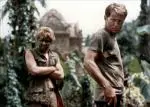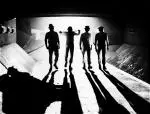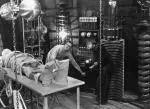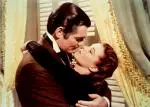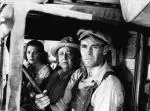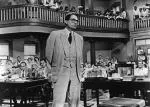This month, Joe Wright’s adaptation of Leo Tolstoy’s novel Anna Karenina hits theaters and has already begun to collect divisive reviews on the film festival circuit. Much like Wright’s 2005 adaptation of Pride and Prejudice, critics argue that Wright’s lush visual style is at odds with a fair and respectful adaptation of such beloved source material.
But as much as I am a bookworm, I am also a film lover, and I know that slavish conformity is never the most effective way to adapt even the best novel. When I want an all-encompassing visual recapitulation of my favorite books - and I often do – I turn to mini-series, which are able to make room for far more textual details than your average feature film. The mini-series of Pride and Prejudice, Jane Eyre, Roots, Lonesome Dove and Emma have all offered comprehensive retellings of some wonderful literature.
But a comprehensive retelling isn’t what a feature film is for, even if it is adapting one of the greatest novels of all time. Films have a different purpose and approach, and brevity is crucial.
So while none of the below titles may include every detail from the books they’ve adapted, they capture the spirit, the heart of those novels. And that’s what matters.
![]() Apocalypse Now
Apocalypse Now
Francis Ford Coppola’s 1979 adaptation of Joseph Conrad’s 1899 novella Heart of Darkness takes prodigious leaps from the source material. Conrad isn’t even credited as a writer on the film. But the themes of the film are deeply entrenched in those of the novella: the duality of man, moral ambiguity, the dark depths of the human soul, the consequences of war and imperialism. Coppola may have changed the location, the temporal setting, the characters, but Apocalypse Now is a masterpiece, a pitch black reflection of humanity every bit as powerful – if not more so – than Heart of Darkness.
[amazon 0486264645 inline]
![]() A Clockwork Orange
A Clockwork Orange
In 1971 Stanley Kubrick adapted Anthony Burgess’ 1961 novella, the dystopian satire A Clockwork Orange. Both the book and film explore society’s dangerous preoccupation with violence, the hypocrisy of authority, the relative success of aversion therapy, and what goodness truly means. But Burgess later dismissed Kubrick’s film, claiming that it “seemed to glorify sex and violence. The film made it easy for readers of the book to misunderstand what it was about, and the misunderstanding will pursue me until I die.” However, I believe that Kubrick’s adaptation is a brilliant representation of Burgess’ writing, an unblinking and unafraid portrayal of youth culture’s obsession with ultraviolence that merely presents that obsession without judgment, hardly glorifying it.
[amazon B004RZ31ZK inline]
![]() Dangerous Liaisons
Dangerous Liaisons
The 1988 film directed by Stephen Frears is adapted from Choderlos de Laclos’ 1782 epistolary novel Les Liaisons Dangereuses. De Laclos’ novel examines the debauched self-indulgence and cruel whims of the French aristocracy, a condemnation that could not be more aptly exposed than in the film. The movie is clever and lively, powerfully incisive. What works so well about Dangerous Liaisons is that it unmasks the similar decadence of the decade in which the film was made. The best modern adaptations of classic tales do not merely reflect the conditions of the past but the present as well. Dangerous Liaisons damns both the aristocracy of the 1700s and the glitterati of the 1980s with equal precision.
[amazon 0140449574 inline]
![]() Doctor Zhivago
Doctor Zhivago
David Lean’s 1965 film Doctor Zhivago adapts the Russian 1957 novel of the same name, written by Boris Pasternak. Both the film and the book take place during the Russian Revolution and present the ambiguity of that revolution, illustrating the ways in which change can beget both progress and destruction. And both the film and the novel offer epic romances that thrive and suffer in the midst of historical upheaval. The film may not be entirely faithful to Pasternak’s novel, focusing more on the romance than the revolution, but it is passionate and formidably moving.
[amazon 0307390950 inline]
![]() Frankenstein
Frankenstein
James Whale’s 1931 horror film is adapted from the book Frankenstein; or, The Modern Prometheus written by Mary Shelley in 1818. The movie is an elegant execution of the terror and tragedy Shelley infused in her revolutionary novel. It would be so easy to turn Frankenstein into purely a monster show, but the film never sells out Shelley’s work. The movie is as touching and humane, as heartbreaking and existential as the novel that shares its name.
[amazon 1615243496 inline]
![]() Gone With the Wind
Gone With the Wind
In 1939 Victor Fleming took on Margaret Mitchell’s wildly popular Civil War novel, published only three years earlier, in a grand fashion that blew away audiences and paid worthy homage to the original work. This is a story about survival against any odds, and rather than making the film a mere trifle focusing on Scarlett’s many romances (although those are of course duly represented), Gone With the Wind captures the fierce, full-bodied spirit of Mitchell’s novel, taking that substantial narrative and broadcasting it with magnificent scope.
[amazon 1451635621 inline]
![]() The Grapes of Wrath
The Grapes of Wrath
The 1940 film adaptation of John Steinbeck’s The Grapes of Wrath, directed by John Ford, is absorbing and stark, drenched in bleak sunlight, and truly conveys the desperation and hunger, both emotional and physical, of the Joad Family. The film was made only a year after the novel’s publication, and Ford and his leading man Henry Fonda wasted no time honoring the book, a book that explores inhumanity and compassion in equal terms. The film is dignified and heartfelt, a worthy successor to Steinbeck’s seminal novel.
[amazon 0143039431 inline]
![]() Jane Eyre
Jane Eyre
This is the most recent adaptation on the list, a 2011 film by Cary Fukunaga that adapts Charlotte Bronte’s 1847 bildungsroman. The book is one of my favorites and I am most partial to the 2006 Masterpiece Theatre mini-series, so I did not have high expectations for the feature film. How wrong I was! Fukunaga’s adaptation is at times luxurious and other times spartan, a wonderfully crafted film that never falls flat. No, this film is lively and moving, exploring the themes of class and independence, feminism and morality in a way that never feels preachy.
[amazon 0486424499 inline]
![]() Lolita
Lolita
The second Kubrick film on the list. His 1962 treatment of Vladimir Nabokov’s controversial 1955 novel seemed impossible at first – a movie wherein the protagonist is a pedophile, released to wide audiences with the notoriously uptight MPAA’s approval? Kubrick is subtle and clever in his retelling of Humbert Humbert’s love affair with his twelve-year-old stepdaughter. While the film does not go as deep as Nabokov’s insightful assessment of alienation and inadequacy, it’s still acute, elegant and wickedly sly.
[amazon 0679723161 inline]
![]() To Kill A Mockingbird
To Kill A Mockingbird
The last film on the list for alphabetical reasons but perhaps first when it comes to quality, Robert Mulligan’s 1962 film based on Harper Lee’s 1960 novel is beautifully executed, a warm adaptation that makes no attempt to dumb down the profound and intelligent source material. While Mulligan’s direction should not be slighted – the film is deeply atmospheric and resonant – a tremendous amount of credit is due to the leading man. Gregory Peck’s performance as one of the most lasting characters of our time, Atticus Finch, is one for the ages.
[amazon 0061743526 inline]
So, what did I leave out? What doesn’t belong on this list? Lay it on me in the comments!

About the author
Meredith is a writer, editor and brewpub owner living in Houston, Texas. Her four most commonly used words are, "The book was better."
